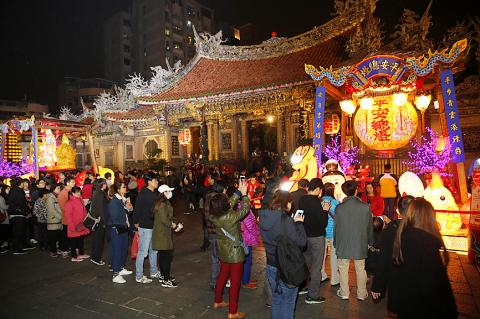Beijing yesterday announced that starting today it is suspending a program that allowed individual tourists from 47 Chinese cities to travel to Taiwan, citing the current state of relations between the two sides.
Chinese nationals may only travel to Taiwan as tourists if they are part of tour groups, the Chinese Ministry of Culture and Tourism said in a statement.
The ministry’s statement did not provide any further details as to the reason for the ban.

Photo: CNA
The unexpected move comes as China attempts to isolate Taiwan and President Tsai Ing-wen’s (蔡英文) administration.
Travel to Taiwan was opened to Chinese nationals in 2011, during former president Ma Ying-jeou’s (馬英九) administration.
The move might also be aimed at hurting Tsai’s re-election chances in the presidential election on Jan. 11 next year.
Chinese Ministry of Foreign Affairs spokeswoman Hua Chunying (華春瑩) declined to answer a question about the decision, asking reporters at a briefing in Beijing yesterday afternoon to talk to the relevant department for Taiwan affairs.
The Mainland Affairs Council issued a statement condemning the move, saying that cross-strait tourism is an important way of promoting better understanding.
It called on Beijing to discuss the issue with Taipei.
The Tourism Bureau said it regretted Beijing’s decision and hoped for a return to positive interaction with China.
“This is a shock to all of us. We are all very worried about it,” Taipei Association of Travel Agents chairman Benny Wu (吳志健) said by telephone. “This will have a huge impact on Taiwan’s tourism [industry] and economy.”
Spending by foreign tourists accounted for about 2.2 percent of GDP in 2017, the last year for which data is available, according to the bureau.
China was the largest single source of people visiting Taiwan and accounted for almost one-third of total visitors to the nation in May, according to a Bloomberg calculation based on data published by the bureau.
“As Taiwan is holding a presidential election soon, it’s not surprising that China is banning its citizens from visiting Taiwan,” KGI Securities Investment Advisory Co (凱基投顧) chairman Chu Yen-min (朱晏民) said.
“It seems to be a routine practice ahead of elections, as China doesn’t want its citizens to witness democracy,” Chu added. “The ban is expected to have a limited impact on Taiwan’s economy and stock market, as those hit are mostly not listed companies.”

Tropical Storm Gaemi strengthened into a typhoon at 2pm yesterday, and could make landfall in Yilan County tomorrow, the Central Weather Administration (CWA) said yesterday. The agency was scheduled to issue a sea warning at 11:30pm yesterday, and could issue a land warning later today. Gaemi was moving north-northwest at 4kph, carrying maximum sustained winds near its center of up to 118.8kph and gusts of 154.8kph. The circumference is forecast to reach eastern Taiwan tomorrow morning, with the center making landfall in Yilan County later that night before departing from the north coast, CWA weather forecaster Kuan Shin-ping (官欣平) said yesterday. Uncertainty remains and

SEA WARNING LIKELY: The storm, named Gaemi, could become a moderate typhoon on Wednesday or Thursday, with the Taipei City Government preparing for flooding A tropical depression east of the Philippines developed into a tropical storm named Gaemi at 2pm yesterday, and was moving toward eastern Taiwan, the Central Weather Administration (CWA) said. Gaemi could begin to affect Taiwan proper on Tuesday, lasting until Friday, and could develop into a moderate typhoon on Wednesday or Thursday, it said. A sea warning for Gaemi could be issued as early as Tuesday morning, it added. Gaemi, the third tropical storm in the Pacific Ocean this typhoon season, is projected to begin moving northwest today, and be closest to Taiwan on Wednesday or Thursday, the agency said. Today, there would likely

DISRUPTIONS: The high-speed rail is to operate as normal, while several airlines either canceled flights or announced early departures or late arrivals Schools and offices in 15 cities and counties are to be closed today due to Typhoon Gaemi, local governments announced last night. The 15 are: Taipei, New Taipei City, Taoyuan, Tainan, Keelung, Hsinchu and Kaohsiung, as well as Yilan, Hualien, Hsinchu, Miaoli, Chiayi, Pingtung, Penghu and Lienchiang counties. People should brace for torrential rainfall brought by the storm, with its center forecast to make landfall on the east coast between tonight and tomorrow morning, the Central Weather Administration (CWA) said. The agency issued a sea warning for the typhoon at 11:30pm on Monday, followed by a land warning at 11:30am yesterday. As of

CASUALTY: A 70-year-old woman was killed by a falling tree in Kaohsiung as the premier warned all government agencies to remain on high alert for the next 24 hours Schools and offices nationwide are to be closed for a second day today as Typhoon Gaemi crosses over the nation, bringing torrential rain and whipping winds. Gaemi was forecast to make landfall late last night. From Tuesday night, its outer band brought substantial rainfall and strong winds to the nation. As of 6:15pm last night, the typhoon’s center was 20km southeast of Hualien County, Central Weather Administration (CWA) data showed. It was moving at 19kph and had a radius of 250km. As of 3pm yesterday, one woman had died, while 58 people were injured, the Central Emergency Operation Center said. The 70-year-old